Alfred Hitchcock's immortal horror film Psycho is celebrating its 60th anniversary in 2020, so it only makes sense that we'd want to celebrate the freaky old flick. While there's not much that hardcore movie geeks don't know about this endlessly lauded, wildly influential film, here are 14 things that you might not have known about this horror classic.
1. Alfred Hitchcock paid less than $10,000 for the rights to Psycho.
Alfred Hitchcock paid $9000 for the film rights to Robert Bloch's novel, which he purchased based on a positive review he read in The New York Times. (He also made the bid anonymously, so as to keep the project under wraps for as long as possible.)
2. Alfred Hitchcock financed Psycho himself.
Paramount had all sorts of cold feet regarding the project, which prompted Hitchcock to both pay for the film out of his own pocket and forgo his (rather substantial) director's fee in exchange for 60 percent ownership of the film. This highly uncommon arrangement put a lot of money in Hitchcock's pocket. Plus the film doesn't even belong to Paramount anymore; it's been a Universal title since 1968. (Bad move, Paramount.)
3. Psycho’s ending was spoiled months before the film's release.

Despite Hitchcock's fervent and admirable attempts at keeping the project a secret, both Variety and The Hollywood Reporter published very thorough spoilers regarding the Psycho plot months before the film actually came out.
4. Visible holiday decor in Psycho led to a December setting.
At the beginning of the film, the viewer is informed that the movie opens on December 11, which is only because some of the second unit shots (as Marion hightails it out of Phoenix) contain visible Christmas decorations.
5. Alfred Hitchcock wouldn't let Psycho be screened before its premiere.
The aforementioned media breach led Hitchcock to take even more extreme measures to guard the film's plot—and ending. In addition to withholding the release of any stills from the movie's key scenes, Hitchcock refused to let film critics see the movie ahead of time, which may have accounted for some of the movie's less-than-stellar opening weekend reviews. (Although it's safe to say that Hitchcock had the last laugh overall.)
6. Late moviegoers weren't allowed in to see Psycho.
Not only was Hitchcock intent on keeping the film under wraps until the last possible minute—he also instructed theaters to not allow anyone in once the film had started. And they did it!
7. Psycho is the first American film to feature a toilet.
Psycho is the first American film to show a toilet on screen. It's also the first American film in which we hear a toilet being flushed. (That's just how repressed Americans were in the 1950s.)
8. There are three Norma Bates featured in Psycho.
No less than three actresses recorded Norma Bates's dialogue. Their recordings were then mixed together until Hitchcock found the right tone of voice for each particular scene.
9. Alfred Hitchcock makes his cameo in a cowboy hat.

The Master of Suspense was well-known for showing up in each of his movies, and Psycho was no exception: take note of the gentleman standing outside the office building a little over six minutes into the film. Yes, that's Alfred Hitchcock in the cowboy hat.
10. Psycho was given an R rating—a quarter-century after its release.
The film was given an R rating by the MPAA in 1984. Yes, a film released in 1960 is now rated R. (The MPAA ratings system wasn't created until 1968, but they do like to re-rate older films from time to time.)
11. Psycho’s famous score is all strings.
Despite Hitchcock's early intention to use jazz, Bernard Herrmann's immortal Psycho score contains only stringed instruments.
12. Saul Bass's fingerprints are all over Psycho.

Not only did celebrated title (and poster) artist Saul Bass create the opening credits sequence for Psycho, he also helped out in the storyboard department—most notably for the legendary shower sequence.
13. Psycho was Alfred Hitchcock's most successful film.
Psycho was Alfred Hitchcock's most successful film, financially speaking. It made $32 million at the North American box office during it first theatrical release, off of a production budget of approximately $807,000.
Hitchcock's next biggest hits were Rear Window, which grossed about $27.5 million in 1954, and Notorious, which made approximately $24.5 million in 1946.
14. Psycho earned Alfred Hitchcock his final Oscar nomination.
Psycho marked the fifth and final time that Hitchcock would earn an Oscar nomination for Best Director. (The Academy gave him the Irving G. Thalberg Memorial Award in 1968.) Yes, you read that right: Alfred Hitchcock never won an Oscar for directing! Let that sink in for a bit.
Additional Sources: Universal Blu-ray special features
